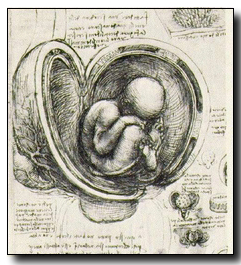In loco parentis
- GENE EDWARD VEITH
Artificial wombs might end abortion, but the price would be the end of the family.
 |
The
Foetus in the Womb by Leonardo da Vinci |
Scientists are reportedly well on their way to developing an artificial womb. At Cornell, womb cells have been replicated and fashioned into an out-of-body receptacle that has kept human embryos alive for several days, before the experiment and the babies were terminated to comply with in-vitro fertilization laws. Japanese researchers have devised chambers of amniotic fluid with nutrient pumps to nourish developing baby goats. Though some scientists doubt whether a human baby could be brought to term completely outside a mother's body a process known technically as "ectogenesis" others believe solving the technical difficulties is just a matter of time, possibly as little as five years.
Even though an artificial womb could make the family technologically obsolete, the prospect is panicking the abortion industry and cheering many pro-life activists.
Writing in the liberal New Republic, Sacha Zimmerman argues that the artificial womb will be, in the words of her title, "The Real Threat to Roe v. Wade." "If and when" ectogenesis is perfected, she writes, "the legal and philosophical premises underpinning Roe could be completely dismantled."
Roe vs. Wade rests on two principles: the viability of the fetus and the woman's right to privacy. As Ms. Zimmerman explains it, an artificial womb would mean that the fetus would be viable from the moment of conception. The developing baby could, at any point, survive outside the woman's body. As for the right to privacy, strangely construed by Roe vs. Wade to imply the right not to be pregnant, removing an unwanted baby and transferring him or her into an artificial womb would be no more intrusive than obtaining an abortion.
With the availability of artificial wombs, the old pro-abortion canard "I have the right to do whatever I want to with my body" would no longer apply. The life of her baby no longer need depend on her body. If a woman does not want to be pregnant, the child could be removed from her womb and implanted into an artificial one for subsequent adoption.
In response, some "pro-choicers" are proving that they are, in fact, pro-death. Feminist philosopher Christine Overall, in her book Human Reproduction: Principles, Practices, Policies, insists that abortion is all about the right not to procreate, not just the right not to be pregnant. She maintains that "fetal extinction" needs to be the goal.
On the other side of the issue, many pro-life activists are hailing the technology, which they believe may turn the tide in the abortion debate. Not only would ectogenesis undo the legal foundations of Roe vs. Wade, it would convince the public which could see the babies growing in amniotic tanks that life begins with conception. Artificial wombs could save the lives of untold millions of babies.
Some on both sides of the debate are arguing that the artificial womb could be a solution to the whole contentious issue, a win-win proposition, as abortion would no longer be necessary.
But while the artificial womb may be beneficial in battling the holocaust of abortion, it comes with a monumental cost: the technological obsolescence of motherhood.
This may well be perceived as the ultimate medical victory. Just as medicine has cured many ailments and mitigated so much human suffering, now there will be a cure for the pains of childbearing. What woman would voluntarily choose the discomforts of pregnancy and the suffering of labor when her baby instead could simply come out of a machine?
Women would be obsolete. Their all-important power to engender and bear children would be transferred to a machine, liberating them from motherhood and handing feminists a huge victory.
The family would also be obsolete. Sex has already been divorced from procreation by birth-control technology and a popular culture that has promoted sex as entertainment sensation apart from the family. Already, sex is not even necessary for procreation, as a test tube and a petri dish can work just as well to conceive a new human life. Finish the baby up in an artificial womb, and pop it out when done. Children could be manufactured, in the numbers needed, by the state, which could raise them in specially designed schools. Who needs the family at all?
Women would be liberated from being wives and mothers. Men would be liberated from being husbands and fathers. Children would be liberated from their parents. Everyone could have sex with everyone else, according to their preferences, since sex would be liberated from both culture and biology. We would all live in a Brave New World.
Technology tends to hand us double-edged swords. Pro-family groups might use this particular sword as a weapon against mass abortion, but it can also be used to cut up the family once and for all.
 This is Meaghen Gonzalez, Editor of CERC. I hope you appreciated this piece. We curate these articles especially for believers like you.
This is Meaghen Gonzalez, Editor of CERC. I hope you appreciated this piece. We curate these articles especially for believers like you.
Please show your appreciation by making a $3 donation. CERC is entirely reader supported.

Acknowledgement
Gene Edward Veith. "In loco parentis." World Magazine 18 no. 42 (November 1, 2003).
Reprinted with permission of World Magazine.
The Author
Gene Edward Veith is a Professor of Humanities at Concordia University and Cultural Editor for WORLD. He is also the author of seven books, including Postmodern Times: A Christian Guide to Contemporary Thought and Culture (1994) and Reading Between the Lines (1991). Veith has degrees from the University of Kansas and the University of Oklahoma.
Copyright © 2003 WORLD Magazine

